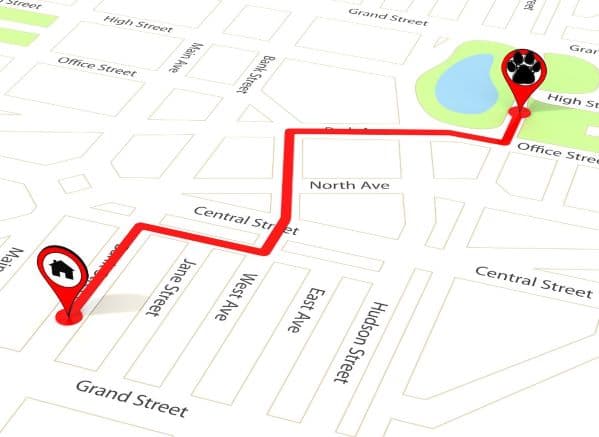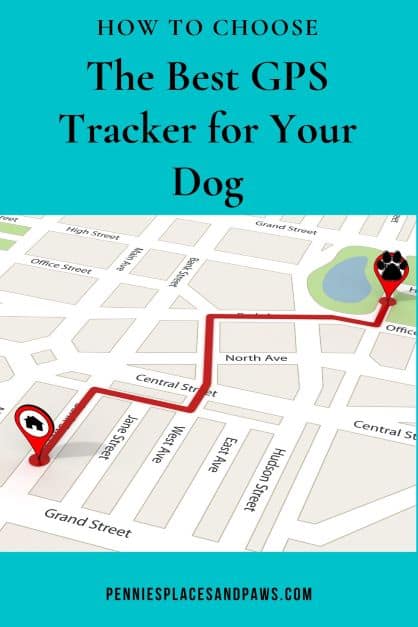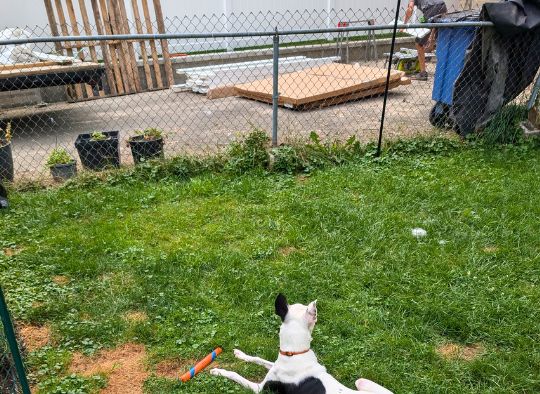How to Choose the Best GPS Tracker for Your Dog
As an Amazon Associate, I earn from qualifying purchases. We may receive a commission for purchases made through these links. This site also contains affiliate links to products besides Amazon, like Etsy. We may receive a commission for purchases made through those links too (at no additional cost to you).
Choosing a GPS Tracking Device for a Dog
If you have a dog that tends to wander away from home or you travel a lot with your pet, you might be looking to purchase a GPS tracking device for your dog. Trying to find the right one for you and your pup can be overwhelming with all the options on the market. I can’t tell you which is the ‘best’ GPS tracker available today. However, I CAN help you to choose the best GPS tracker for your dog. This guide will go over things that you should consider like the way the device works, how it attaches, the price, and extra features.

Why Get a Dog GPS Tracker?
If you have a dog, you already spend quite a bit of money on necessities like food, toys, and vet care. You may be asking yourself if a GPS tracker is really needed. If you are on the fence, here are a few things to consider when making your decision on whether you should purchase one or not.
How old is your dog?
If you have a puppy or an elderly dog, you should consider getting a GPS tracker. A puppy is still learning the rules of life and can easily be distracted. Their recall cue may not be secure yet which can make it very easy for them to get lost if they ever escape off-leash or out of your yard.

On the other hand, as dogs become more senior, they can become easily confused and have memory issues (just like people). Combined with the loss of sight and hearing, if they wander off, they might not find their way back to you. In both situations, finding your dog as quickly as possible will help keep them safe and get them back home as quickly as possible.
The people in your household
Households with small children or anyone who isn’t extra aware of their surroundings should look into tracking devices. It takes just a moment for your pup to see an opening and run out of the door. This frequently happens with small children because they don’t know to be careful and are too small to stop the dog from running out.

This also happens with adults who may not be paying attention to what’s going on outside or have their hands full carrying things in and out of the house. A cat, bird, or squirrel could be passing by at the perfect time to get your pup excited enough to give chase out the front door. Without a way to block your pets from the door, there is always a chance they can escape if they see something outside that they want.
Your dog’s personality and breed
Some dogs have a huge taste for adventure. Huskies in general are known to be runners and escape artists. If you have a dog that loves going on solo adventures, you should definitely invest in a GPS tracker.

Are you a frequent traveler?
Do you travel a lot with your dog? Losing my dog at a rest area or on vacation has always been one of my biggest fears. We constantly hear stories from owners that must choose between going back home to work or continuing to search for their dog that has run away on vacation. We have also found our fair share of lost pups that need to be reunited with their out-of-town owners.

For tips on traveling with your pup, we have articles to help you plan a dog-friendly vacation and what your dog needs on a road trip.
If any of these situations sound familiar, please consider purchasing a GPS-tracking device for your pup. An updated tag and microchip are wonderful aids if you and your dog get separated, but they only work if someone finds your dog and calls the number on the tag or takes your pup to a vet to check for a microchip. A GPS tracker is something that can help you find your dog without counting on a stranger’s kindness and your dog’s willingness to allow a stranger to get close to them.
How to Choose the Best GPS Tracker For Your Dog
Currently, there are SO many different types of GPS devices on the market and everyone claims that they are the best. Instead of trying to figure out which brand is telling the truth, it’s better to concentrate on which GPS tracker is best for YOU. Each device works differently and does different things. One type will work best if you are looking for your dog in a city and they are close by, and others will work great if you are in the middle of nowhere and your dog is miles away. Here are the things we found were the most important, when deciding which device to buy for our family.

How Does the Dog GPS Tracker Attach?
One of the simplest choices you can make regarding your GPS Tracker is how you want it to be attached. You can choose between getting a device implanted (like a microchip), a dog tag, a unit that attaches itself to your dog’s collar or harness, or a GPS collar.
- An implant will require an appointment with a veterinarian so there are extra costs involved. The plus side is that since it is inside of your pup, it can’t break or fall off at any point like the other models can.
- The trackers that look like dog tags tend to be the least expensive, however, in my opinion, they are also the easiest to fall off if you have a dog that likes to rub on things.
- GPS trackers that attach to your dog’s collars tend to be more secure than the tags, but it does depend on HOW they are attached to the collar. Some systems will be tougher than others. No matter how they attach, you will want to check them regularly so you can tighten or replace the fasteners as needed.
- GPS collars are probably the most secure type of device apart from the implant.
How Does the GPS Device Track Your Dog?
There are a few different methods used by GPS devices when tracking your dog and it’s important to choose the one that will work best for your needs. Depending on the device, they can use Bluetooth, cellular, radio, satellite, or a mix of these.
- Bluetooth tracking usually requires an app downloaded on your phone. Since it is based on Bluetooth, these trackers only work if your dog isn’t too far from you (like your phone needs to be a certain distance from your car or speakers for them to work).
- Devices that operate on cellular service can work over a much greater distance than Bluetooth because they ‘talk’ through a cell phone tower. The downside to this is that your tracker won’t work if you are in an area with no cell service. Since the GPS is dependent on cell phone towers, it is important to check what cell service the company works for so you know what areas you will have the best service in and what areas you may have trouble in.
- Radio tracking sends a signal from your dog’s device to a receiver. Like Bluetooth trackers, the device only works when it is within range of the receiver, but the range of the radio trackers covers a much larger distance. This system will work in areas with no cell phone service.
- Satellite tracking works by sending the signal via satellite. These typically are the most expensive, but they work pretty much everywhere and have a huge range.
Before choosing your preferred method of GPS tracking, please take a moment to think about where you will most likely need it to work. For most pet owners Bluetooth tracking isn’t that beneficial because their pets will typically run outside of the range that it works in. If you do a lot of backwoods hiking or camping trips in areas with no cell service, then you will want to choose a device that tracks via radio or satellite. If you mostly stay in areas with cell service, then the cellular tracking devices may be best (depending on the cellular company it works with).
How Much Will the Dog GPS Tracker Cost?
GPS trackers for dogs can range anywhere from around $20 to over $1000. The satellite and radio collars are typically the most expensive with the ones that are like dog tags usually being the least expensive. The upfront price will depend on the style, the WAY and RANGE it can track your dog, and the extra bonuses (waterproof, step counter, etc.).
Unfortunately, the upfront price of the unit can be misleading. Many of the trackers require a monthly or yearly subscription for them to be able to track your dog. This price varies depending on the company you choose and if you choose to pay it monthly, annually, or even bi-annually.
This is an important thing to check because when you add the subscription fees to the cost of the device, it can dramatically change the total price you would be paying for your tracker. You will want to make sure that the subscription fees are an amount that will be able to continue to fit into your budget.
What Else Does the Dog GPS Tracker Do?
One of the final things to consider before selecting your GPS tracker is the extra features that it comes with. Most of the extras ultimately will depend on your personal preferences but there are two that I strongly believe any tracker you choose should have.

Make sure that your device is waterproof and shockproof. You want a device that can survive being knocked around as your dog runs and plays and getting wet if they choose to swim or get caught in the rain. Another important feature to consider is the battery life. Some devices can switch into battery saver mode when your dog goes out of the safe or home zone which will give you more time to find them before the battery dies.
As for the other features, simply look them over and decide which ones will benefit you and your dog the most. Some GPS collars double as training collars and others have activity trackers that record things like their steps, calories burned, sleep, and more.
Which GPS Tracker Did We Choose?
The entire process of trying to find the best deal and the right device for your pup can be overwhelming. I know that sometimes it can help to see someone else’s thought process when deciding so here is a quick rundown of how we choose FitBark as our dogs’ GPS trackers.
Originally, we started looking for a GPS tracking system for our littlest dog Charlie when we started camping more frequently. Charlie has a high prey drive and a bad habit of hiding when he is stressed or thinks he is being yelled at. Unfortunately, this also includes when we yell his name to get him to come back to us (we do a whistle recall now). Losing him in the woods was a huge concern for us because we knew if we ever got separated it would be extremely difficult to find him without a tracking device.

Because our dogs like to rub and squeeze between and into things, we knew a tag-styled device would quickly get lost. We also wanted a device that we could switch between pups until our budget allowed us to get one for each of our dogs. This meant we needed a GPS collar or something that was attached securely to a collar.
The main goal of the GPS tracker was to find our dogs if they ever got separated from us on vacation. Our personal cell phone service is Verizon, and we typically get service almost everywhere we go. This meant that we could get a device that used cellular, radio, or satellite.
Our budget was not high enough to invest in most satellite or radio trackers, so we focused on cellular. Since we knew how well Verizon worked for us, we looked for a device that also used Verizon. After comparing extra features, as well as the upfront and maintenance costs, we decided to go with the Fitbark.

The Fitbark helps us monitor our dog’s health by tracking things like their sleep and activity cycles. They also use the Verizon network. They recently came up with a 2nd generation that uses T-Mobile and ATT&T towers as well as Verizon to help increase their service area. We pay around $95 a year for service in addition to the upfront cost of the device, which we found to be one of the better deals. For our full review on Fitbark, keep an eye out in the upcoming weeks.
Happy Shopping!
Now that you have a better idea of where you will need your dog’s GPS tracker to work and what you will want it to do, you’ll be able to invest in a device that works best for your dog. When you have narrowed down your choices, don’t forget to read the reviews before you commit to purchasing. This way you will be able to hear firsthand opinions from real customers.
After you choose the device you want, keep an eye out for sales. Most devices go on sale several times throughout the year, and you can save quite a bit of money if you are willing to wait. If you have any questions or are looking for advice from other pet owners join our Travelling Pet Owners Facebook Group. I hope this article helps you take some of the guesswork out of selecting the ‘best’ GPS tracker for you and your pup!
Pin For Later:

Amazon and the Amazon logo are trademarks of Amazon.com, Inc, or its affiliates.






